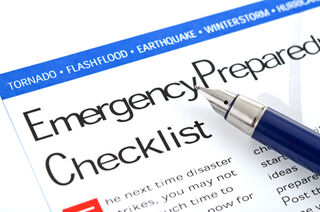Stress
This Paper Can Help Your Loved One in a Mental Health Crisis
Writing this document could save a lot of time and stress in an emergency.
Posted February 16, 2021 Reviewed by Lybi Ma

It was the fall of 2015 in more ways than one. It was the season — mid-November — and, as I paced back and forth on the sidewalk of Wilshire boulevard with my cellphone against my ear, providing details to a 911 representative, I only knew one thing for certain: My mother had taken a fall.
I was rambling a bit, trying to describe my mother’s current state, but I didn’t know quite how to begin so I kept starting over, sifting through the different pieces of data stored in my mind that may or may not be helpful to convey. My ear started to hurt. Not realizing it, my hand was pressed so tightly to my head, it was causing the ear pain. I was having trouble describing the situation I found myself in yet again, explaining my mother to a stranger.
“Your mother is already where?” the representative asked, perplexed that I was calling from a medical facility where my mother was already waiting to see a doctor. I was perplexed too, considering my mother's desire only for a refill on an expired prescription in making the appointment and not the severe injury she had suffered. “Is your mother in immediate danger?” I recall the representative asking. I wasn't sure how to begin.
I’d rushed to the urgent care my mother had provided and found her seated in a corner of the large sterile waiting room, holding something up to her jaw. She said she’d been in some kind of accident. When I arrived, I recognized her clothes and purse, but she was seated with her back to the entry doors. I rushed over to her, called out her name. She turned to me and my forward motion stuttered out when I saw her face.
On the right side, her face was completely normal. On the left, her features were so bloated to be totally obscured, her eye so swollen she could barely see. I’d called 911 because I’d felt confused and helpless. My mother had very little recollection of what had happened, and all she cared about was her expired prescription. She was rarely forthcoming to doctors about her health history, which included an array of ER visits, dozens of doctors and prescriptions. Before and after this particularly unsettling injury, I found myself in front of doctors having no idea how to communicate with them about her.
Recently, I completed an online class offered free by the nonprofit National Alliance on Mental Illness: Westside L.A. in which I learned about preparing a strategy for these situations, one that can serve as an invaluable resource during these often unpredictable, high-pressure moments: a one-page health crisis history.
After the class, I thought of the countless memories I have on the phone or speaking directly to doctors, 911 personnel and police dispatch about how to best describe and assist my mother. In every situation, I improvised my words, never wanting to think about the next time, the next mishap, the next scare, while always fearing its arrival all the same. Sometimes, these interactions were in a controlled situation, with my mother resting comfortably in a hospital bed after a medical procedure, other times they were after accidents involving drugs and alcohol where my mother’s communications skills or her memory were compromised. In class, I also heard from other individuals who shared their own stories, sometimes much more dire or volatile than my own, trying to manage during one of these crises and feeling panicked and overwhelmed.
I look back on these moments now and envision how useful this piece of paper would have been, had I handed it to a nurse, a doctor, a police officer or paramedic. Unlike me, the paper would not be in a state of duress. The piece of paper would not have shaky nerves or anger or fear, but it would have helpful facts that needed to be communicated. The one-page mental health history isn't difficult to create. Once you gather the information and write or type it out, you can keep a printed copy handy and update it as needed. In any situation, whether it's anticipated or out of the blue, now this paper can be provided to any professional or person to provide background, context and medical information.
Below is suggested information you can include on this document, as advised by the free-to-access materials on NAMILA.org:
"Instructions for writing the one-page mental health history of your loved one:
- Include your loved one’s name, age and insurance information on top. Note their insurances, such as Medi-Cal, Medicare, or private insurance. (They can have all three.) Note what financial resources they receive, such as SSI, SSDI, or Social Security. (Do not include their social security number.)
- Note your loved one’s diagnosis. If you do not know the diagnosis and the event occurred because of their mental illness, you can write “psychotic behavior.”
- List your loved one’s symptoms.
- List your loved one’s medications and other drug use, including overdoses.
- In chronological order, starting with the most recent event, list your loved one’s history of hospitalizations, incarcerations, homelessness and any restraining orders that may have been required.
- Write the approximate date(s) as best you can recall, the facilities where they have been placed (or, if homeless, the general area if it is known).
- Note any allergies your loved one may have.
- Limit this information to only one page. Allow space at the bottom of the page to note any allergies, medical problems, or medicines they should not have.
- If you have more information and it won’t fit on one page, then include on the bottom of the page that they have been ill since the age of ___, and/or that they have had ___ amount of previous hospitalizations, incarcerations, homeless situations."
As I plan to do my taxes for last year, I find myself ruminating on the benefits of keeping related information in one easy-to-find place. For me, it took my entire 20s, a decade of haphazardly rummaging in disorganized desk drawers and last-minute paper-trails to force myself to devise a better system. The better system wasn’t hard or time-consuming. The better system simply required developing forethought where before there was none. Now I use a folder, either a manila one or a digital one, and everything for the year related to taxes goes in the folder. I shake my head thinking about how much I avoided making something easier just so I didn’t have to think about it, and how human the impulse can be to avoid preparation for unpleasant or painful experiences.
Taxes are one thing; we know they are coming with a clear, consistent schedule. Other events in life are much less certain, but we prepare for those too, like a kit for an earthquake or end-of-life care directives, circumstances that are often unplanned or unpredictable, but knowing there’s a plan and resources already in place brings peace of mind.
It’s hard to feel helpful or in control of much when witnessing or living through a mental health crisis. In reality, that day years ago on the phone, if I'd made this mental health history and read it over the phone, or given it to the doctors she saw, it might have been helpful or it might have made no difference in her care. I don't have control over the results of my actions, but at least I think I would have felt more confident that I'd done what I could within reason.
Creating this mental health history one-page handout is a productive way to prepare, to alleviate the familiar sense of helplessness that comes with emergencies of any kind. I see it as a practical expression of love and concern, both for my own mental health and for that of a loved one. We cannot control the seasons, nor how or where our loved ones may suffer a proverbial fall, but I think this small exercise in forethought is a way to offer compassionate action: a positive for the loved one as well as to myself, regardless of the outcome.




